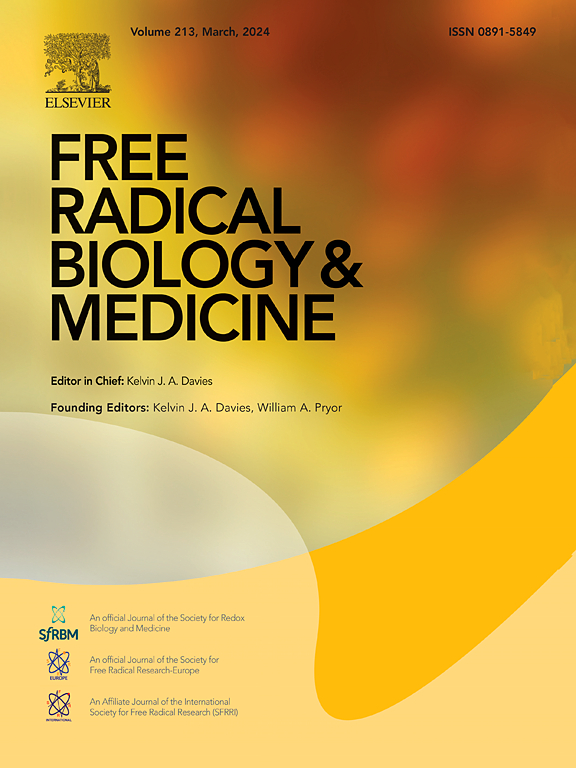Distinct roles of ascorbic acid in extracellular vesicles and free form: Implications for metabolism and oxidative stress in presymptomatic Huntington's disease
IF 7.1
2区 生物学
Q1 BIOCHEMISTRY & MOLECULAR BIOLOGY
引用次数: 0
Abstract
Huntington's disease (HD) is a neurodegenerative disorder caused by a CAG trinucleotide repeat expansion in the first exon of the huntingtin gene. The huntingtin protein (Htt) is ubiquitously expressed and localized in several organelles, including endosomes, where it plays an essential role in intracellular trafficking. Presymptomatic HD is associated with a failure in energy metabolism and oxidative stress. Ascorbic acid is a potent antioxidant that plays a key role in modulating neuronal metabolism and is highly concentrated in the brain. During synaptic activity, neurons take up ascorbic acid released by glial cells; however, this process is disrupted in HD. In this study, we aim to elucidate the molecular and cellular mechanisms underlying this dysfunction. Using an electrophysiological approach in presymptomatic YAC128 HD slices, we observed decreased ascorbic acid flux from astrocytes to neurons, which altered neuronal metabolic substrate preferences. Ascorbic acid efflux and recycling were also decreased in cultured astrocytes from YAC128 HD mice. We confirmed our findings using GFAP-HD160Q, an HD mice model expressing mutant N-terminal Htt mainly in astrocytes. For the first time, we demonstrated that ascorbic acid is released from astrocytes via extracellular vesicles (EVs). Decreased number of particles and exosomal markers were observed in EV fractions from cultured YAC128 HD astrocytes and Htt-KD cells. We observed reduced number of multivesicular bodies (MVBs) in YAC128 HD striatum via electron microscopy, suggesting mutant Htt alters MVB biogenesis. EVs containing ascorbic acid effectively reduced reactive oxygen species, whereas “free” ascorbic acid played a role in modulating neuronal metabolic substrate preferences. These findings suggest that the early redox imbalance observed in HD arises from a reduced release of ascorbic acid-containing EVs by astrocytes. Meanwhile, a decrease in "free" ascorbic acid likely contributes to presymptomatic metabolic impairment.

抗坏血酸在细胞外囊泡和游离形态中的独特作用:对症状前亨廷顿病代谢和氧化应激的影响
亨廷顿氏病(HD)是一种神经退行性疾病,由亨廷顿基因第一外显子CAG三核苷酸重复扩增引起。亨廷顿蛋白(Htt)在包括核内体在内的几种细胞器中普遍表达和定位,在细胞内运输中起着重要作用。症状前HD与能量代谢和氧化应激障碍有关。抗坏血酸是一种有效的抗氧化剂,在调节神经元代谢中起关键作用,并高度集中在大脑中。在突触活动期间,神经元吸收神经胶质细胞释放的抗坏血酸;然而,这一过程在HD中被破坏。在这项研究中,我们旨在阐明这种功能障碍的分子和细胞机制。使用电生理方法,在症状前的YAC128 HD切片中,我们观察到从星形胶质细胞到神经元的抗坏血酸通量减少,这改变了神经元代谢底物的偏好。培养的YAC128 HD小鼠星形胶质细胞的抗坏血酸外排和循环也减少。我们用GFAP-HD160Q证实了我们的发现,这是一种主要在星形胶质细胞中表达突变n端Htt的HD小鼠模型。我们首次证明了抗坏血酸是通过细胞外囊泡(EVs)从星形胶质细胞释放的。培养的YAC128 HD星形胶质细胞和Htt-KD细胞的EV组分中颗粒和外泌体标记物数量减少。我们在电镜下观察到YAC128 HD纹状体中多泡体(MVBs)的数量减少,表明突变Htt改变了MVB的生物发生。含有抗坏血酸的ev有效地减少了活性氧,而“游离”抗坏血酸则在调节神经元代谢底物偏好中发挥作用。这些发现表明,HD患者早期氧化还原失衡是由星形胶质细胞释放含抗坏血酸的EVs减少引起的。同时,“游离”抗坏血酸的减少可能导致症状前代谢障碍。
本文章由计算机程序翻译,如有差异,请以英文原文为准。
求助全文
约1分钟内获得全文
求助全文
来源期刊

Free Radical Biology and Medicine
医学-内分泌学与代谢
CiteScore
14.00
自引率
4.10%
发文量
850
审稿时长
22 days
期刊介绍:
Free Radical Biology and Medicine is a leading journal in the field of redox biology, which is the study of the role of reactive oxygen species (ROS) and other oxidizing agents in biological systems. The journal serves as a premier forum for publishing innovative and groundbreaking research that explores the redox biology of health and disease, covering a wide range of topics and disciplines. Free Radical Biology and Medicine also commissions Special Issues that highlight recent advances in both basic and clinical research, with a particular emphasis on the mechanisms underlying altered metabolism and redox signaling. These Special Issues aim to provide a focused platform for the latest research in the field, fostering collaboration and knowledge exchange among researchers and clinicians.
 求助内容:
求助内容: 应助结果提醒方式:
应助结果提醒方式:


